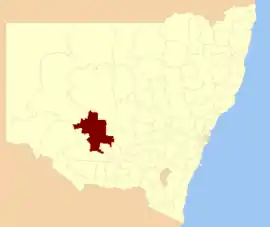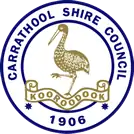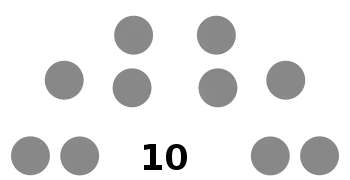| Carrathool Shire New South Wales | |||||||||||||||
|---|---|---|---|---|---|---|---|---|---|---|---|---|---|---|---|
 Location in New South Wales | |||||||||||||||
| Coordinates | 33°58′S 145°42′E / 33.967°S 145.700°E | ||||||||||||||
| Population |
| ||||||||||||||
| • Density | 0.143615/km2 (0.37196/sq mi) | ||||||||||||||
| Area | 18,932.61 km2 (7,309.9 sq mi)[3] | ||||||||||||||
| Council seat | Goolgowi[4] | ||||||||||||||
| Region | Riverina and Far West | ||||||||||||||
| State electorate(s) | Murray | ||||||||||||||
| Federal division(s) | Farrer[5] | ||||||||||||||
 | |||||||||||||||
| Website | Carrathool Shire | ||||||||||||||
| |||||||||||||||
The Carrathool Shire is a local government area that borders both the Riverina and Far West regions of New South Wales, Australia. The Shire comprises 18,933 square kilometres (7,310 sq mi) and is located adjacent to the Mid-Western Highway and north of the Sturt Highway.
The largest town in the Shire is Hillston and the council seat is Goolgowi. The Shire also includes the villages of Merriwagga, Rankins Springs and Carrathool.
Where once regular droughts made life almost untenable, the area now has irrigated crops, gardens, greened sporting facilities and village verges. Over 15,000 square kilometres (5,800 sq mi) are now used in rural pursuits, including more than 600 square kilometres (230 sq mi) in wheat, rice, vineyards, cotton, potatoes, vegetables and orchard trees. Most of the change was made possible by the widespread use of river and underground water.
Demographics
| Selected historical census data for Carrathool Council local government area | ||||||
|---|---|---|---|---|---|---|
| Census year | 2011[6] | 2016[1] | ||||
| Population | Estimated residents on census night | 2,587 | ||||
| LGA rank in terms of size within New South Wales | 126th | |||||
| % of New South Wales population | 0.04% | |||||
| % of Australian population | 0.01% | |||||
| Cultural and language diversity | ||||||
| Ancestry, top responses | Australian | 35.5% | ||||
| English | 29.8% | |||||
| Irish | 9.6% | |||||
| Scottish | 8.0% | |||||
| German | 3.1% | |||||
| Language, top responses (other than English) | Korean | 0.5% | ||||
| Afrikaans | n/c | |||||
| Italian | 0.4% | |||||
| Punjabi | 0.4% | |||||
| Mandarin | n/c | |||||
| Religious affiliation | ||||||
| Religious affiliation, top responses | Catholic | 31.5% | ||||
| Anglican | 24.6% | |||||
| No religion | 13.3% | |||||
| Not stated | n/c | |||||
| Uniting Church | 11.6% | |||||
| Median weekly incomes | ||||||
| Personal income | Median weekly personal income | A$527 | A$681 | |||
| % of Australian median income | 91.3% | 102.9% | ||||
| Family income | Median weekly family income | A$1143 | A$1538 | |||
| % of Australian median income | 77.2% | 88.7% | ||||
| Household income | Median weekly household income | A$942 | A$1240 | |||
| % of Australian median income | 76.3% | 86.2% | ||||
History
In May 1934 Carrathool Shire Council voted to remove the shire offices from Carrathool to Goolgowi. The decision was made because Carrathool township was located at the south-west corner of the large shire, whereas Goolgowi was in a more central position.[7]
Council
Current composition and election method
Carrathool Shire Council is composed of ten councillors elected proportionally as two separate wards, each electing five councillors. All councillors are elected for a fixed four-year term of office. The mayor is elected by the councillors at the first meeting of the council. The most recent election was held on 4 December 2021. The makeup of the council is as follows:[8][9]

| Party | Councillors | |
|---|---|---|
| Independents and Unaligned | 10 | |
| Total | 10 | |
The current Council, elected in 2021, in order of election by ward, is:
| Ward | Councillor | Party | Notes | |
|---|---|---|---|---|
| A Ward[8] | Darryl Jardine | Unaligned | Mayor[10] | |
| Heather Lyall | Independent | |||
| Geoff Peters | Unaligned | |||
| David Fensom | Independent | |||
| Julie Potter | Unaligned | |||
| B Ward[9] | Mick Armstrong | Unaligned | ||
| Leon Cashmere | Unaligned | |||
| Beverley Furner | Unaligned | Deputy Mayor[10] | ||
| William Kite | Independent | |||
| Damon Liddicoat | Unaligned | |||
2021 election results
| Party | Votes | % | Swing | Seats | Change | ||
|---|---|---|---|---|---|---|---|
| Independent | 694 | 100.0 | +0.0 | 10 | |||
| Formal votes | 694 | 97.9 | |||||
| Informal votes | 15 | 2.1 | |||||
| Total | 709 | 100.00 | |||||
| Registered voters / turnout | 1,792 | 39.56 | |||||
References
- 1 2 Australian Bureau of Statistics (27 June 2017). "Carrathool (A)". 2016 Census QuickStats. Retrieved 7 July 2017.
- ↑ "3218.0 – Regional Population Growth, Australia, 2017-18". Australian Bureau of Statistics. 27 March 2019. Retrieved 27 March 2019. Estimated resident population (ERP) at 30 June 2018.
- ↑ "Carrathool Regional Profile". Riverina Regional Development Board. Archived from the original on 20 July 2008. Retrieved 28 August 2008.
- ↑ "Carrathool Shire Council". New South Wales Division of Local Government. Archived from the original on 29 July 2008. Retrieved 28 November 2008.
- ↑ "Profile of the electoral division of Farrer (NSW)". Australian Electoral Commission. 25 February 2016. Retrieved 12 July 2016.
- ↑ Australian Bureau of Statistics (31 October 2012). "Carrathool (A)". 2011 Census QuickStats. Retrieved 7 July 2017.
- ↑ 'Transfer of Council Chambers', Sydney Morning Herald, 9 May 1934, page 14.
- 1 2 "Carrathool Ward A - Councillor Election results". NSW Electoral Commission. 21 December 2021. Retrieved 18 March 2022.
- 1 2 "Carrathool Ward B - Councillor Election results". NSW Electoral Commission. 4 December 2021. Retrieved 18 March 2022.
- 1 2 dbrighenti (11 January 2022). "Election of the Mayor and Deputy Mayor". www.carrathool.nsw.gov.au. Retrieved 18 March 2022.
- ↑ "Carrathool". ABC News.